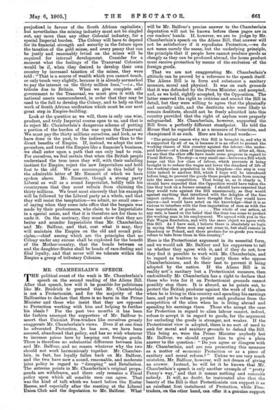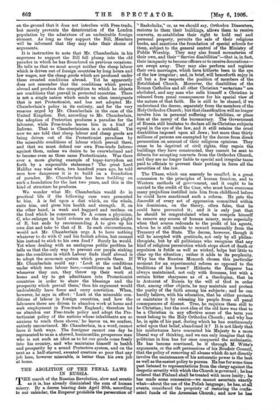T HE political event of the week is Mr. Chamberlain's speech
on the second reading of the Aliens Bill. After that speech, how will it be possible for politicians like Mr. Brodrick to pretend that Mr. Chamberlain is not a Protectionist, and for the majority of the • Balfourites to declare that there is no harm in the Prime Minister and those who insist that they are opposed to Protection working with him and helping to further 'his ideals ? For the past two months it has been the fashion amongst the supporters of Mr. Balfour to assert that Unionist Free-traders like ourselves grossly exaggerate Mr. Chamberlain's views. Even if at one time he advocated Protection, he has now, we have been assured, abandoned that policy, and has no wish whatever to increase prices here by keeping out foreign goods. There is therefore no substantial difference between him and Mr. Balfour, and no reason whatever why the two should not work harmoniously together. Mr. Chamber- lain, in fact, has loyally fallen back on Mr. Balfour, and the two have now a sound, reasonable, and moderate joint policy in regard to " dumping " and Retaliation. The extreme points in Mr. Chamberlain's original propa- ganda are withdrawn, and there only remains a Fiscal policy upon which all sensible men can agree. That was the kind of talk whieh.we heard before the. Easter Recess, and especially after the meeting at the Liberal Union Club and the deputation to Mr. Balfour. What will be Mr. Balfour's precise answer to the Chamberlain deputation will not be known before these pages are in our readers' hands. If, however, we are to judge by Mr. Chamberlain's speech on the Aliens Bill, that answer will not be satisfactory if it repudiates Protection,—we do not mean merely the name, but the underlying principle, the principle that if people here cannot produce goods as cheaply as they can be produced abroad, the home product must receive protection by means of the exclusion of the foreign goods.
That we are not exaggerating Mr. Chamberlain's attitude can be proved by a reference to the speech itself. The Aliens Bill is in form and substance a sanitary measure, moral and physical. It was on such grounds that it was defended by the Prime Minister, and accepted, and, as we hold, rightly accepted, by the Opposition. The latter reserved the right to criticise and amend the Bill in detail; but they were willing to agree that the physically and morally unfit, and the destitute who were likely to remain destitute, should not be freely admitted into this country provided that the right of asylum were properly safeguarded. Mr. Chamberlain, however, supported the Bill' from a perfectly different standpoint. He told. the House that he regarded it as a measure of Protection, and championed it as such. Here are his actual words:— " The principal reason why this Bill is brought in, and why it is supported by all of us, is because it is an effort to protect the working classes of this country against the labour—the under- paid labour—of a class of immigrants sent here. After all, then, we see that the other sile have made some progress in regard to Fiscal Reform. The step—a very small one—between a Bill which keeps out this low class of labour, which prevents it being brought in to reduce the wages and lower the standard of life of the working-class population in this kingdom—the step is very little indeed to another Bill, which I hope will be introduced before long, to prevent the goods these people make from coming into the same competition. That being so, as it clearly is, I should have expected that the Opposition would have taken the line they took on a former occasion. I should have expected that they would vote against the Bill unanimously, as they would against anything that interfered with the delights of the free import system. I should have thought that they would have known—and would have acted on the knowledge—that it is as vicious to interfere with the free importation of men as with the free importation of goods. . . . . . The whole of our action, at any rate, is based on the belief that the time has come to protect the working man in his employment. We agreed with you in the Fair Wages Resolution, and with the same object we agree with this Bill. As I have said, I believe there is absolutely no logic in saying that these men may not come in, but shall remain in Hamburg or Poland, and there produce for us goods you would refuse to take from them in this country."
Here is the Protectionist argument in its essential form, and we would ask Mr. Balfour and his supporters to tell us whether they agree with it, and if they do not, how they find it possible to work with Mr. Chamberlain, and to regard as traitors to their party those who oppose Chamberlainism, and do their best to prevent it being adopted by the nation. If the Aliens Bill is in reality not' a sanitary but a Protectionist measure, then undoubtedly Mr. Chamberlain has a right to declare that those who vote for it on Protectionist grounds cannot possibly stop there. It is absurd, as he points out, to protect the British producer against the work of the alien when he is living in this country and spending his earnings here, and yet to refuse to protect such producer from the competition of the alien when he is living abroad and spending his earnings there. Those who accept the case for Protection in regard to .alien labour cannot, indeed, refuse to accept it in regard to goods, for the argument for excluding the goods is stronger, not weaker.. If the Protectionist view is adopted, there is no sort of need to seek for moral and sanitary grounds to defend the Bill. This being so, were the Prime Minister anybody but Mr. Balfour, we should expect him to give a plain answer to the question : " Do you agree or disagree with Mr. Chamberlain, and are you presenting this measure as a matter of economic Protection or as a piece of sanitary and moral reform ? " Unless we are very much mistaken, Mr. Balfour, however, will not dream of giving an answer. Instead, he will let it be known that Mr. Chamberlain's speech is only another example of " pretty Fanny's way," and that it means nothing and commits nobody. It will, no doubt, be insinuated also that the beauty of the Bill is that Protectionists can support it as an excellent first instalment of Protection, while _Free- traders, on the other hand, can offer it a tenuinasupport on the ground that it does not interfere with Free-trade, but merely prevents the deterioration of the London population by the admixture of an undesirable foreign element. As long as they support the Bill, Members will be informed that they may take their choice of arguments.
It is instructive to note that Mr. Chamberlain in his eagerness to support the Bill fell plump into the old paradox in which he has floundered on previous occasions. He tells us that we must accept neither the cheap labour which is driven out of foreign countries by long hours and low wages, nor the cheap goods which are produced under these sweated conditions abroad. Yet he apparently does not remember that the conditions which prevail abroad and produce the competition to which he objects are conditions that prevail in protected countries. There is not a single nation which sends us alien immigrants that is not Protectionist, and has not adopted Mr. Chamberlain's policy in its entirety, and for the very reasons urged by Mr. Chamberlain in the case of the United Kingdom. But, according to Mr. Chamberlain, the adoption of Protection produces a paradise for the labourer, while Free-trade leaves him in a kind of Inferno. That is Chamberlainism in a nutshell. Yet now we are told that cheap labour and cheap goods are being driven out of the Protectionist paradises by the miserable conditions of labour which prevail there, and that we must defend our own Free-trade Inferno against them, unless we desire to be overwhelmed and to become even as these same Protectionists. Was there ever a more glaring example of topsy-turvydom set forth by a responsible statesman ? The great Lord Halifax was wise when, two hundred years ago, he told men how dangerous it is to build on a foundation of paradox. Mr. Chamberlain has been building on such a foundation for the last two years, and this is the kind of structure he produces.
We wonder what Mr. Chamberlain would do in practical life if the following case were presented to him. A is fed upon a diet which, on the whole, suits him, and gives him health and strength. B, on the other hand, is weak and haggard and restless on the food which he consumes. To A comes a physician, C, who enlarges in lurid colours on the miserable plight of B, but ends by recommending A to give up his own diet and take to that of B. In such circumstances, would not Mr. Chamberlain urge A to have nothing whatever to do with C and his foolish advice, but counsel him instead to stick to his own food ? Surely he would. Yet when dealing with an analogous public problem he tells us that the only way to prevent our people sinking into the condition in which Labour finds itself abroad is to adopt the economic system which prevails there. If Mr. Chamberlain could say : 'Look at the conditions under which men labour here,—conditions so bad that, whenever they can, they throw up their work at home and try to get admittance into Protectionist countries in order to share the blessings and the prosperity which prevail there,' then his argument would undoubtedly have force and carry conviction. When, however, he says in effect: Look at the miserable con- ditions of labour in foreign countries, and how the labourers there are driven to abandon work at home and seek employment in Free-trade England ; therefore let us abandon our Free-trade policy and adopt the Pro- tectionist policy of the nations whose inhabitants are so anxious to reach these shores,' he leaves us, we confess, entirely unconvinced. Mr. Chamberlain, in a word, cannot have it both ways. The foreigner cannot one day be represented to us as a shrewd, businesslike, prosperous man who is not such an idiot as to let our goods come freely into his country, and who maintains himself in health and prosperity by a sound Protective system, and on the next as a half-starved, sweated creature so poor that any job here, however miserable, is better than his own job at home.











































 Previous page
Previous page